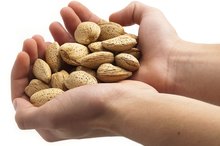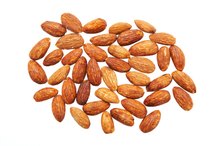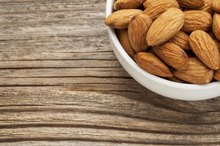Shelled Peanuts: Nutrition Facts
Peanuts are a healthy snack because they provide unsaturated fats, omega-3 fatty acids, L-arginine, fiber, vitamin E and plant sterols, which are good for your heart, according to MayoClinic.com. But 80 percent of a nut is comprised of fat, so eat them in moderation.
Calories, Fat and Sugar
A serving of shelled peanuts is 1/2 cup. Each serving contains 166 calories, 14 g of fat and no sugar. Salt-free peanuts contain 1 g of sugar.
Carbohydrates and Protein
How Many Calories in Carrot Sticks?
Learn More
One serving of shelled peanuts provides 6 g of carbohydrates and also provides 7 g of protein.
Vitamins and Minerals
Salted shelled peanuts contain 230 mg of sodium, 187 mg of potassium, but they do not provide vitamin A, vitamin C, calcium or iron. Unsalted shelled peanuts contain no sodium, calcium or iron, but they do provide 180 mg of potassium. Both salted and unsalted shelled peanuts provide 2 g of dietary fiber.
Related Articles
References
- My Fitness Pal: Calories in Nuts Peanuts - Dry, Roasted, Salted, Shelled
- My Fitness Pal: Calories in Hoody's Roasted in Shell Peanuts No Salt
- MayoClinic.com: Nuts and Your Heart
- Peanuts, all types, raw. FoodData Central. U.S. Department of Agriculture. Published April 1, 2019.
- Diabetes peanuts help control blood sugar. The Peanut Institute. Updated 2020.
- Peanut protein, fats & carbs: peanut macronutrients. The National Peanut Institute. Updated 2020.
- Arya SS, Salve AR, Chauhan S. Peanuts as functional food: A review. J Food Sci Technol. 2016;53(1):31-41. doi:10.1007%2Fs13197-015-2007-9
- Peanut vitamins & minerals: Micronutrients. The Peanut Institute. Updated 2020.
- Hou YY, Ojo O, Wang LL, et al. A randomized controlled trial to compare the effect of peanuts and almonds on the cardio-metabolic and inflammatory parameters in patients with type 2 diabetes mellitus. Nutrients. 2018;10(11). doi:10.3390/nu10111565
- Alves RD, Moreira AP, Macedo VS, et al. Regular intake of high-oleic peanuts improves fat oxidation and body composition in overweight/obese men pursuing a energy-restricted diet. Obesity (Silver Spring). 2014;22(6):1422-9. doi:10.1002/oby.20746
- Bonnefont-Rousselot D. Resveratrol and cardiovascular diseases. Nutrients. 2016;8(5). doi:10.3390/nu8050250.
- Arya SS, Salve AR, Chauhan S. Peanuts as functional food: A review. J Food Sci Technol. 2016;53(1):31-41. doi:10.1007/s13197-015-2007-9
- Bunyavanich S, Rifas-Shiman SL, Platts-Mills TA, et al. Peanut allergy prevalence among school-age children in a US cohort not selected for any disease. J Allergy Clin Immunol. 2014;134(3):753-5.
- American Academy of Allergy, Asthma, and Immunology. Newly issued clinical guidelines from the NIAID recommend early peanut introduction, not avoidance. 2017.
- Salehi B, Mishra AP, Nigam M, et al. Resveratrol: A double-edged sword in health benefits. Biomedicines. 2018;6(3). doi:10.3390/biomedicines6030091
- Peanut types. National Peanut Board. Updated 2020.
- How long will that peanut butter last?. National Peanut Board. Updated 2020.
- Kumar P, Mahato DK, Kamle M, Mohanta TK, Kang SG. Aflatoxins: A global concern for food safety, human health and their management. Front Microbiol. 2016;7:2170. doi:10.3389/fmicb.2016.02170
Writer Bio
Chris Callaway started writing professionally in 2007 and has worked as sports editor, managing editor and senior editor of "The Racquet" as well as written for the "La Crosse Tribune" and other newspapers in western Wisconsin. He graduated from the University of Wisconsin-La Crosse with a Bachelor of Arts in English and communications.









